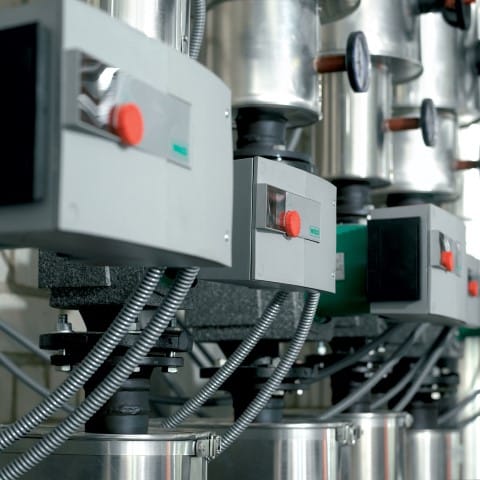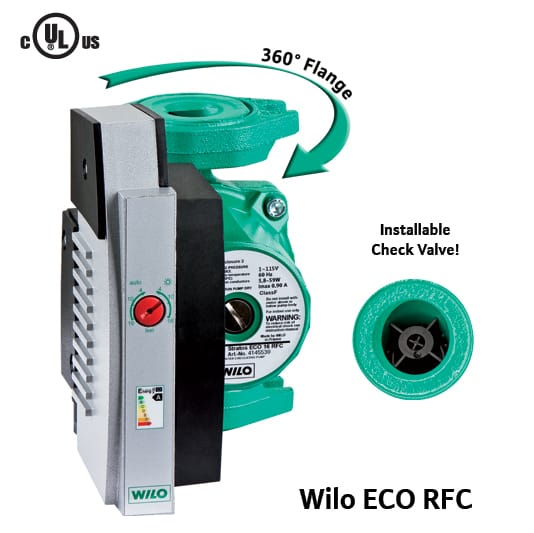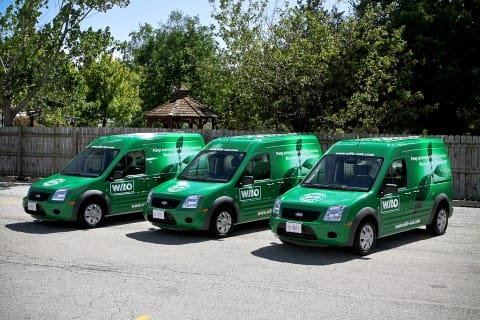Founded in 1872, Wilo SE (Wilo USA’s parent company) began providing circulators to the P&H industry in 1928. Wilo SE has grown to a $1.5B USD global entity focusing on energy efficient pumping solutions. Wilo USA, a wholly owned subsidiary of Wilo SE, was founded in 2006 and in that time has grown to approximately $50M USD’s in sales. Corporate offices in Rosemont, Illinois, and a state-of the-art manufacturing facility in Thomasville, Georgia. Wilo USA employs 65 people and continues the parent company’s global mission towards acceptance of energy efficient pumps and solutions.
Recently, Mechanical Hub's John Mesenbrink caught up with Mark D'Agostino, president and CEO, Wilo USA LLC. The following is from that exclusive interview:
MH: When I saw you at Mechanical Systems Week in Schaumburg a couple months back you intomated to me that Wilo was really the pioneer of the smart pump. Can you explain how Wilo is the innovator and leader in smart pump technology?
D'Agostino: As most Americans know, utility costs, specifically electricity and petro-chemical fuels, are much more expensive in other areas of the world. As a company that focused mainly on the European continent until the mid 2000’s, Wilo SE (Wilo USA’s parent company) pioneered ECM (electronically commutated motors) pump technology. These pumps provided a “dual efficiency effect” in that they dramatically reduced (by as much as 80%) the power consumption to operate the pump but also allowed the pump to vary it’s speed to match specific system flow demands which, in turn, increased the efficiency of the combustion fuel of the system. When Wilo USA was established, we were tasked with “pioneering” this technology into the U.S. market. While some manufacturer’s have followed our lead, Wilo USA was the first to bring this technology to the United States and continues to offer the largest and most complete offering of ECM products in the U.S.

MH: How is the pump considered “intelligent”?
D'Agostino: The pump, without the use of any external sensors, can “sense” changes in a heating/cooling systems flow dynamics; a zone valve closing, for example. The Wilo ECM pump can then independently slow down to reduce the flow within the system to match real time demand. Conversely, when that closed zone then reopens, the pump again senses the system dynamic change and speeds up to provide adequate flow. We at Wilo use the comparison to “cruise control” in a car to explain this “intelligent technology.” You simply “set” the pump to operate at maximum load, and then it will automatically speed up and slow down to compensate for flow changes during system operations.
MH: How do these circulators “breathe” energy efficiency and water conservation?
D'Agostino: Certainly the simple fact that these pumps consume up to 80% less electricity than comparable, standard efficiency units, shouts energy efficiency. However, these pumps also increase system efficiency which provides reductions in combustion fuel consumption. All of which lessen carbon emissions, improve overall system comfort and function and save money for the end users.
MH: These circs definitely help in saving energy in a heating/cooling system overall but, are they more or less energy consumptive in the manufacturing process? What materials are used, are they potentially hazardous in their disposal or manufacturing?
D'Agostino: At the core of ECM technology are permanent magnet rotors. Other than some specific materials of construction differences there is essentially no appreciable environmental impact (negative or positive) in the manufacturing process.
MH: Should contractors expect the cost to come down in time due to more manufacturers making the product?
D'Agostino: Certainly, as with all technology, time and competition drive prices down. We have already witnessed this trend in the five years the products have been in the U.S. market.
MH: Any plans of manufacturing “mini” sized circs for use as a single loop (radiant application) circulator? This could take the energy consumption to a new low.
D'Agostino: The technology is currently available exclusively from Wilo in other parts of world, specifically Europe. However, as it requires a significant change in system designs, we are still assessing the viability of this technology in the States, as well as the proper applications to focus on in the U.S.
MH: Are there plans to move to a multi-mode program that is user defined for mode of operation?
D'Agostino: This technology is already available in the vast majority of our ECM products specifically Stratos, Stratos D, Stratos Z, Giga and Helix XL. The ONLY product we do not currently offer mode variants in is our residential ECO unit. The unit operates at in a standard Delta PV mode. It requires ONLY one variant, that is setting the feet of head the circulator needs to overcome at maximum load. The rest of the “intelligent” operation is handled by the pump. Wilo believes that this ease of use is a far superior function to that of multiple modes. We want to provide maximum operational efficiency with minimal field interface.

MH: Any plans being made to make the circulators “repairable”?
D'Agostino: While the industry average failure rate under warranty comes in around 4%, Wilo has an historical average of 1/2 of 1%. That is across ALL products in our portfolio. Within the ECM products it is much lower. Therefore the need for “repairable” units is microscopic. We like to say, instead of buying a pump that’s easy to repair, buy a better pump.
MH: I have seen the Wilo mobile unit out and about. Can you tell me how effective it is to have this vehicle to promote the product?
D'Agostino: The Wilo “Street Fleet” is a particular point of pride for me personally. I conceived the idea several years ago while overseeing Wilo Marketing efforts. It was our desire to provide a mobile education unit that could be used for field trainings, jobsite visits, distributor events and industry exhibitions. The vans provide an interactive display of all Wilo products (while this interview focuses on our Building Services/HVAC division, Wilo also offers products for Municipal Wastewater collection, transport and distribution, Groundwater (borehole) applications, Offshore Energy and Industry) across all of our served markets. The vans are small, which make them easy to get around and par in urban areas but also energy efficent, which helps communicate our corporate message.

For more information on Wilo USA, www.wilo-usa.com.




Join the conversation: